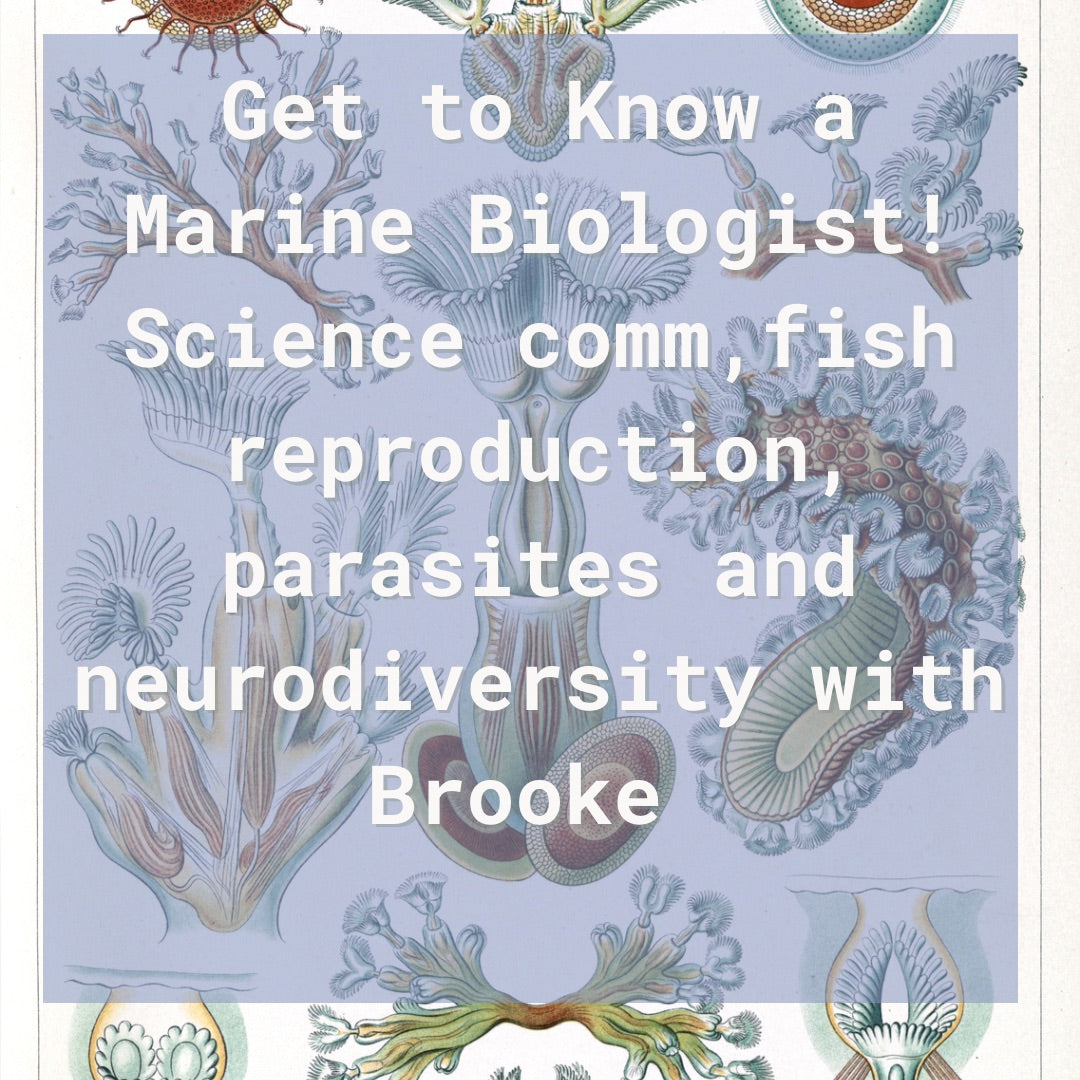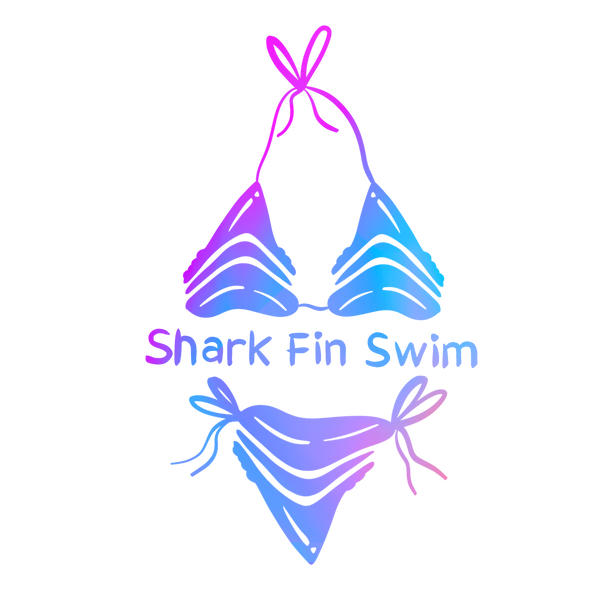
Get to Know a Marine Biologist: Science Communication, Fish Reproduction, and More!
Share

Get to Know a Marine Biologist!
Welcome to a new blog series with Shark Fin Swim. I’m Hope, the founder and ocean illustrator behind Shark Fin Swim. Our small business helps raise awareness for ocean conservation through our hand drawn colorful prints perfect for ocean lovers. Using eco friendly materials and production practices we are bringing ocean advocates a more sustainable option for swimwear. As a biologist and purpose driven small business owner this blog series is going to give you an inside look of what it’s like to be a Marine Scientists Biologists, Diver, Professional mermaid and so much more! Let’s meet our biologist for this week!
Can you introduce yourself and tell us a little about your work?
Hi! My name is Brooke Fitzwater (she/her), and as of writing this I am a PhD candidate studying host sex-parasite interactions, reproductive behavior, and sexual selection! Previously, marine biology fieldwork has taken me to Belize, Florida, Chile, and even Easter Island! Find Brooke on Instagram @oceanfilly

photo via @oceanfilly
What made you want to specialize in fish reproduction and parasitic relationships?
I have always been fascinated by reproductive behavior because you see some of the most extravagant behaviors and ornaments when individuals are trying to woo mates. I got really fascinated with what specific kinds of traits individuals pay attention to, what those traits mean, and when and why they choose them. I also really just love fish and they do some really cool stuff and are incredibly important in our world. The parasite part of my research interests is funny because I actually used to be terrified of parasites after seeing Monsters in Me as a child. In undergrad, a professor talked about the Red Queen Hypothesis as a way to explain why sexual reproduction evolves (sexual reproduction can allow for novel anti-parasite mechanisms in a population), and that topic kind of crawled its way into my brain and started churning questions about how a host’s sex can impact how parasites infect them, and as I started digging in deeper to the literature I became even more excited.
What are some of your favorite species’ reproductive behaviors to talk about?
One of the coolest stories to me is that of the white-spotted pufferfish (Torquigener albomaculosus). For years, Japanese divers had seen these elaborate rings that were complex with indents and patterns. No one knew who was making them until about 2013. Males make these elaborate rings as part of their courtship, and they are likely nests. There are BBC Earth videos on them if you want to see what they look like!”

photo via @oceanfilly
As a big Star Wars Fan, who are some of your favorite characters from the Star Wars universe and what fish species do you think they would be if you had to choose and why?
My top three characters are Ahsoka Tano, Cal Kestis and BD-1 (they are a pair that cannot be separated haha!), and Rey. I think Ahsoka would be drawn to sailfish, she would think the sail is beautiful and would also love the sword rostrum. Cal and BD-1 would be a shark and pilotfish since those two fish swim with one another. I think Rey would really like trumpetfish or cornetfish, not sure why but I could see her liking them!

Photo by Gerald Schömbs on Unsplash
You’ve spoken about your late diagnosis with autism and how the education system is not well suited for people who are neurodivergent. In addition to the lack of support, tools, and teaching methods do you feel there is a stigma in the science/education community around being neurodivergent and lack of representation?
Even outside of neurodivergent-related sci-comm, there is a huge stigma still surrounding science communication because it is still undervalued by many in the scientific community. Many people think of sci comm unfortunately as “the easy way out” for people who “aren’t good enough to do real science.” Luckily, there seems to be a shift in this ideology and people are starting to acknowledge that it is important, especially as a tool to relate to the general public, but many of us in sci-comm still fight this stigma, especially those who are members of a marginalized group. Both in the actual field and in sci comm, there is a lack of representation and stigma about people being open about their diagnoses. Some offer that it is bad for potentially job opportunities that your research should be your focus. My neurodivergence is a part of me and is a critical component of how I do science. I went through so many years thinking something was “wrong” with me, so hearing from neurodivergent scientists at a pivotal part of my career would have been helpful. However, there has been an increase of representation and conversation in social media circles about neurodivergence, and there is more openness to learn about it then there used to be.
Having expressed that negative experiences in education as a neurodivergent person can make someone turn away from a certain subject and that it’s just not for them. What do you feel like teachers or peers can do differently to prevent these types of discouraging experiences?
Universal learning designs are a great way to help everyone, not just neurodivergent students, learn in a classroom setting. Patience is also important: many neurodivergent students need more processing time or process information in different ways. If a student asks a clarifying question, even if you find it “stupidly obvious,” answer it. Many neurodivergent students need to ask clarifying questions. Frame your classroom as a space where there are no stupid questions. Don’t EVER ask a student if they are neurodivergent, and don’t tell them that you “could/couldn’t tell” if they disclose that to you, instead thank them for entrusting you with that information and ask them what you can do to help them succeed and/or refer them to get accommodations.
Outside of the education aspect have you had any experiences during your field work that have presented unexpected challenges from your neurodivergence?
Fieldwork is incredibly hard on everyone, not just neurodivergent folks! It can be exhausting, with long days and being around people in close quarters a lot. You may be working all day for weeks straight. For me, this can wear down on me a lot, particularly if I don’t have a structure. The key that I found is making sure you have time to yourself, even if that means waking up an hour earlier than everyone else just to get that time to self-regulate. Try to establish routines. Listen to your body, if you start feeling overstimulated or irritable, acknowledge that and walk away and take a little break if you need to and self-regulate. Snorkeling breaks or listening to music were helpful for me.

photo via @oceanfilly
Is there anything you wish you could/could’ve communicated to your peers in the field that they could’ve done to better support you (or other neurodivergent peers) or that you wish was more normalized in the field?
If you are in a safe space where you can do so, communicate with everyone your neurodivergence and what accommodations you need. This is sadly not a possibility for everyone, so in those cases, find allies if you have them and communicate with them. It may look like saying that you need an hour to yourself each day to self-regulate, or that when you get overstimulated you may shut down a bit and to let people know what that looks like. If you are autistic like me, you may experience meltdowns or shutdowns. You can explain what those look like and what you need if you experience them. Other people may start showing signs of burnout or become more forgetful, so you can ask that two people be responsible for co-checking equipment or procedures to catch any potential errors.
